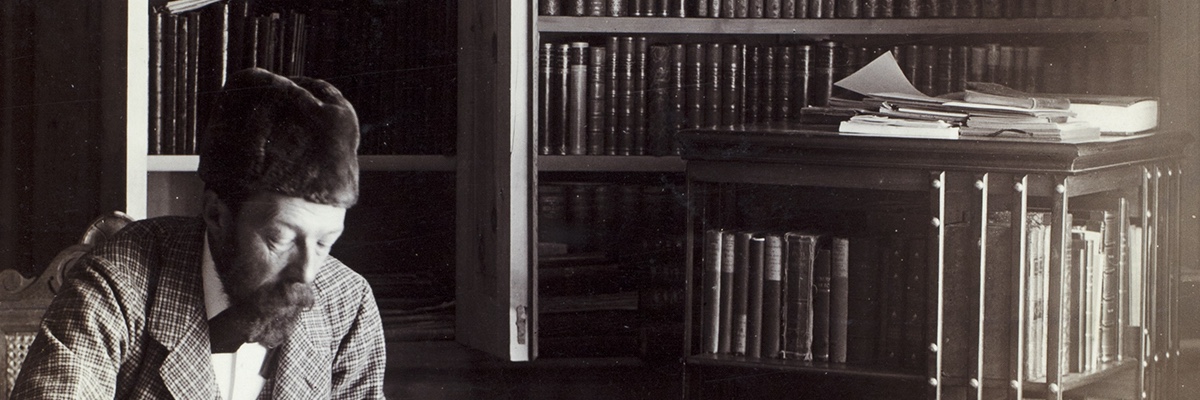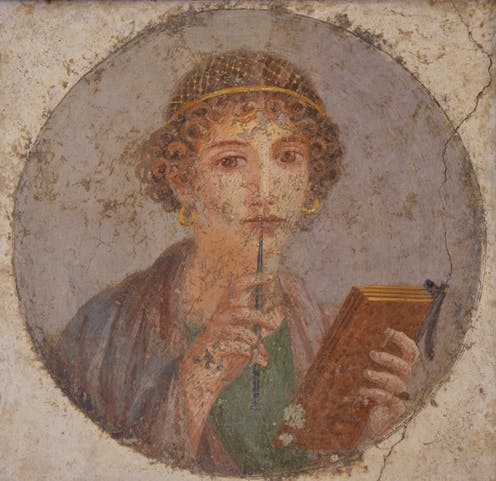The first version of Studies of the Greek Poets is published in 1873. A result of his life-long study in Greek literature, this book looks deeply into the Greek aesthetics, literary traditions, and politics through the lens of poets and the poetry. At this point, Symonds’ knowledge of Ancient Greece is sophisticated enough for him to look at one piece of art and draws out countless ties it has with the whole Greek society.
Symonds starts by giving a temporal and historical account of Greek literature, which he divides into five periods: the Heroic, the transition from Heroic to artistic maturity (B.C. 776 to B.C. 477), the Athenian Supremacy (B.C. 477 to B.C. 413), Athenian Decline (B.C. 413 to B.C. 323), and the final period of decline and decay (B.C. 323 to the final extinction of classical civilization).
It is worth paying attention to Symonds’ descriptions of the Heroic period, which initiates the flourishing splendor of Greek literature. According to Symonds, the influence of Homer’s works infiltrates all emerging literature, aesthetics, ideals of beings, and thereby the Greek society as a whole. He states that “it is from the Homeric poems alone that we can form a picture to our imagination of the state of society in prehistoric Hellas. ”(Studies of Greek Poets, p. 7) For one thing, Homer’s works shed light on the ideal of human life. Infusing the “beautiful human heroism” (p. 9) in Achilles; and in Ulysses the “bravery, subtlety, and cunningness”(p. 9), Homer lays the foundation of one human ideal: a man eloquent and adventurous like Ulysses in his outer appearance; radiant, youthful, adolescent like Achilles in his spirit. Homer puts upon desk the most energetic possibilities of living, which give rise to the Homeric Epic poems, those of Achilles and of Ulysses or the alike. Moreover, Achilles’s death influences the Greek tragedy too. In short, Homer alone inspires the major themes and aesthetics of Greek literature. The history of Greek literary development can therefore be viewed as a process of how the heroism created by Homer develops into a thematic monarchy all over its literature, and then eventually dissolves into a subtle yet omnipresent aesthetics constantly dazzling in later Greek literature.
With this understanding, let us now start approaching the content of Symonds’ scholarly essays. By writing “Studies of the Greek Poets,” Symonds aims to achieve two things: being an informant who “bring[s] Greek literature home to the general reader” and an literary critic who “applies to the Greek poets the same sort of criticism as that which modern classics receive.” (p. 1) In each chapter, Symonds would usually start from an overview, sketching the historical development of one genre, its division and mutation over time, to specific examples that he deems reflect the essence of the genre best. Take the chapter on The lyric poets for example. Symonds starts by introducing the particularities of lyric poems given by its form. According to Symonds, each genre of poetry is donated to a different purpose. “The Hexameter was consecrated to epical narrative; the Elegy was confined to songs of lament or meditation; The Iambic assumed a satiric character. ” (p. 111) The lyrical poetry is connected to personal feeling and of public ceremonial. From there, Symonds then accounts for the different sub-divisions of the lyrical poetry and the relevant names related to each. Through his writings, we are informed of the sublime rhythm of Sappho’s poems which bears a “heart-devouring passion.” (p. 130) And Scolion of Hubrias the Cretan, which sheds light on the early Dorian barbarism. Such analysis enables us to imagine not just the individual lives of the poets; Symonds also puts before our eyes lively pictures of ancient Greek life.
To make his writings more accessible to the modern readers, Symonds uses a lot of comparisons between the Ancient Greece and the society we are more familiar with. For example, when talking about the lyric poems, he compares the mass of “lyric poetry which might have existed in Greek” to the “church music that exists in Germany and Italy.” (p.113) Symonds even dedicates a whole chapter to the comparison between ancient and modern tragedy. In Chapter IX, he argues that the major difference between the modern tragedy and the Greek tragedy lies in that Greek tragedy knows no subtlety in depicting human emotions. Located in open ground with all grand Athenian sceneries around, the Greek theatre does not allow actors to express the wide spectrum of human emotions and passions as does the modern theatre which takes place in indoor chambers. Symonds acutely summarizes this difference as “the ancient dramatist plays with his cards upon the table: the modern dramatist conceals his hand.” (p. 289) In Greek tragedy, a lot of theatrical elements are fixed and simple: the construction, the scenes, etc. Moreover, it keeps using the same well-known characters drawn from Homer and to the Epic cycle, for example, Oedipus, Agamemnon, etc. The audience therefore comes to the theatre with abundant knowledge of the destiny of all characters; it is only the characters themselves who don’t know what they are facing. This renders the Greek Tragedy a sense of irony which is not present in any modern dramas (considering how we all hate spoilers).
While reading this book, I am impressed by how Symonds uses “poets” rather than “poetry” as the thread to link up his arguments. It appears to me that Symonds possesses a keen sense of looking at history, politics, and civilization from the lives and deeds of humans, not the reverse way. One evidence is that Symonds keeps going back to Alexander, who, bearing an unusual parallel to Achilles due to his admiration for Homer’s works, proves the importance of this literary figure to the Greek race. Metaphorically, Symonds loves to draw an analogy between the historical development of literature to a person’s life. Greek literature, with its long-lasting impact on individuals and thereby the society, is the “springtime of the world. The world has now grown gold.” (p. 398) The modern society Symonds lives in inevitably afflicts his mind with human sufferings, with the unexpressed identities, and with all other complications that gradually drains a youthful mind. The Greek society becomes no more than a past dream. At the time of his writing, Symonds is thirty-three. As I am reading Symonds’ imagination of the Greek society, a world he imagines to have “no mystery of darkness, no labyrinth of tortuous shade, no conflict of contrasted forms,” (p.404) I imagine him sitting in his study, his eyes closed. I imagine the rich literature he just read from Pericles, from Sappho, and from Pindar, alleviating the pains he had from illness, and from having to “sit down soberly to contemplate his own besetting vice. ”(Memoirs, p.524) What penetrates through the book pages is Symonds’ yearning for all fair things: integrity, truth, bravery, and ultimately the possibility of a life that conceals nothing. All of these ideals are present in Greek literature. In this light, Symonds clings on to Greek literature for this transcendental beauty that is itself adequate to shine through all dark ages of humanity.
Works Cited:
- John Addington Symonds. Studies of the Greek Poets. London: Smith, Elder & Co., 1873.
- Regis, Amber K. The Memoirs of John Addington Symonds: A Critical Edition. London: Palgrave Macmillan UK , 2016.


One thought on “The world has grown old: reflections on Studies of the Greek Poets by J.A.S”